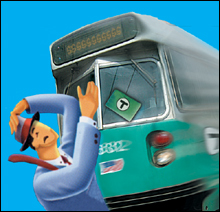|

THE TRUTH BEHIND THE FARE HIKE: If you're wondering who in the current negotiations over a proposed MBTA fare increase is representing the interests of the T rider and the taxpayer, the answer appears to be nobody.
|
If you ride the T, you're about to be jerked around more than ever before.
The rise the Massachusetts Bay Transit Authority (MBTA) got out of you when you read the news that a single T ride would jump from $1.25 to $1.70 was planned, expected, and, some might say, even welcome. The disgust on your face when you read that the outbound Green Line would no longer be free? They were hoping for that as well. You will no longer be able to buy a T-only monthly pass for $44 -- just a combo pass for $66? The one-time bus fare going up from $0.90 to $1.25? Those, too. Stomp your feet, shake your fists, spit on the ground.
As John and Jill Q. Public, you are consistently pawns in battles beyond your control -- from the Big Dig to the city's aggressive community development. And when the MBTA announced its plans for a massive fare hike two weeks ago, it wrapped its hands around your neck and moved you two spaces forward in the first move of what is shaping up to be a nasty chess game between the state and the transit-workers' union. Be prepared to see the MBTA blame your commuting woes on its supposedly sour budget, to watch a presidential hopeful seeking Republican glory play hardball with labor, and to hear talk of a transit strike by a union crying poor mouth (but whose workers get tremendous pension benefits and free health care for life).
Believe it or not, the next two months provide a golden opportunity to improve the MBTA. With gas prices soaring, a whole new group of commuters are thinking of switching to public transportation, which means revenue could increase significantly if the T can attract and keep those riders. A state commission on transportation financing is widely expected to recommend fixing the way the state funds the MBTA, while a major transportation-bond bill, soon to be submitted by Governor Mitt Romney, provides the perfect vehicle for imposing those changes -- and for linking that funding to service improvements. And new systems technology, including the automated fare-collection system now being rolled out, makes it possible to save money while assessing and analyzing levels of service.
Massachusetts could use this combination of technology, funding sources, and labor agreements to establish the means and incentives to improve transit service while keeping it affordable -- as other cities have done, notably Chicago.
But none of that is part of the public conversation or political agenda. None of the players -- the Romney administration, MBTA executives, state legislators, and union negotiators -- want people talking about any of that.
What they want is to jerk you around to suit their own agendas. Which is why you have been told that you'll soon be paying 45 cents more for each T ride you take.
It is why, for example, nobody has disputed the MBTA's claim that its fare structure "is among the lowest of comparable major transit properties." It's true that Boston remains one of the few major cities where you can catch a bus for less than a buck. But the lack of a subway-bus transfer makes that common two-part trek more expensive than in similar cities, while Boston's monthly subway-bus-combo pass is one of the most expensive in the country. (See sidebar, "Cheap Ride?")
It is also why the MBTA followed its rate-hike announcement by distributing a 24-page pamphlet to the public last week, suggesting that, due to the MBTA's "bleak" financial position, it must either raise rates or "customers would experience the most drastic service reduction in MBTA history." This is the kind of public-relations effort that companies often undertake when trying to force concessions from unions during labor negotiations -- which is exactly what's happening at the MBTA: the contract is up on June 30.
Instead of luring riders to the T, the state is announcing massive fare hikes -- almost a dollar more for a roundtrip. Instead of releasing its already-late report on reforming T funding (which was due six months ago), the Transportation Finance Commission has postponed it until the end of the year. Instead of addressing MBTA financing in the state bond bill or the state budget, the administration and legislature are passing on the issue -- at least for now. Instead of discussing service goals, the unions are fighting solely to maintain the best benefits on the planet and to increase wages.
If you're wondering who in all of this is representing the interests of the T rider and the taxpayer, the answer appears to be nobody.